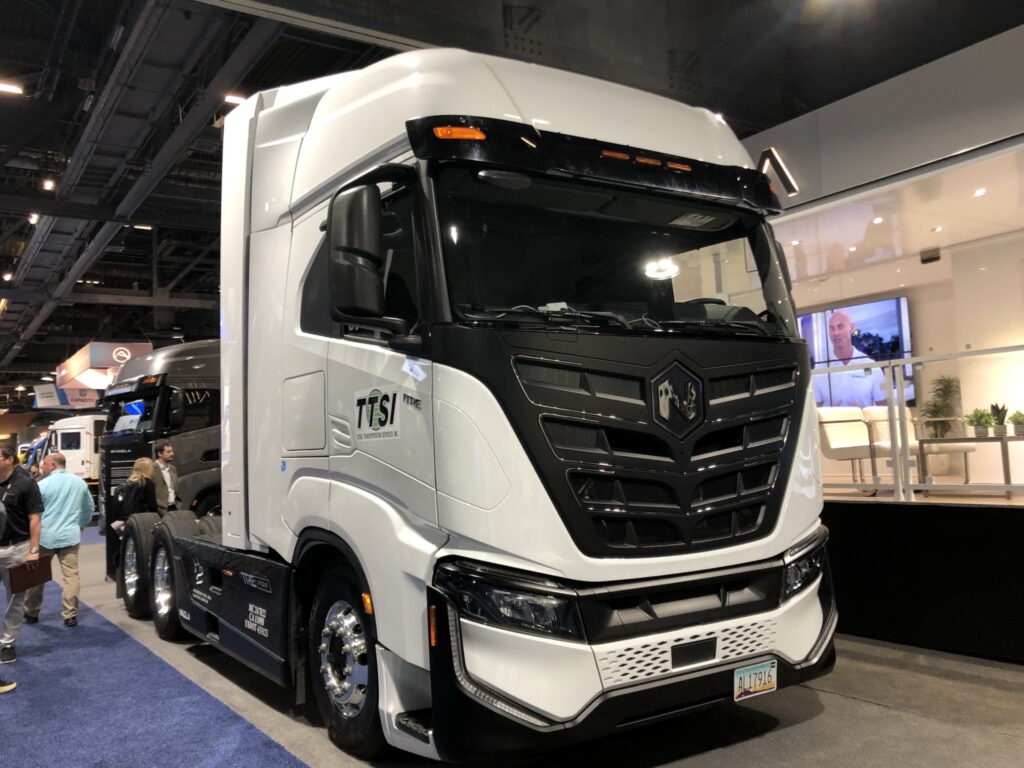Nikola eyes Canada as promising market for hydrogen fuel cell trucks
Nikola Corporation CEO Michael Lohscheller sees Canada as one of the most promising global markets for its hydrogen fuel cell trucks and aims to have its first trucks on the road here by next year.
The manufacturer has already been demonstrating its technology in Alberta in partnership with the Alberta Motor Transport Association (AMTA), and has partnered with Calgary-based TC Energy to bring large-scale hydrogen fueling stations to the province.
“It is our intention to bring the trucks as soon as possible to Canada,” Lohscheller told TruckNews.com in a one-on-one interview a the spring meeting of the Technology & Maintenance Council (TMC). “It’s a very big market. Similar to Europe. There is a lot of support and incentive money, but more importantly an understanding and mindset that decarbonization needs to happen. Sometimes in the U.S. it’s like, alright, we need to do that. But in Canada and Europe people really pay attention to this topic.”

He sees parallels between Canada and Germany in how the two nations view the promise of hydrogen as a way to wean the transportation industry off diesel. “I see Nikola’s key markets as the U.S. – West Coast and East Coast primarily – and Canada and Europe and in Europe, primarily Germany. So Canada is really important to us,” he said.
Hydrogen fueling network
Nikola plans to bring not only its truck to Canada, but also the hydrogen fueling network needed to support those vehicles.
“People always think we are a truck company but maybe we’re actually an energy company with a truck division once you have it all set up,” Lohscheller said. “The infrastructure is probably more important than the truck itself. What’s why we try to think the other way around in terms of hydrogen.”
Hydrogen fuel can be produced cost-effectively where there’s cheap energy and an abundance of water, which Canada has to offer – another reason the company is attracted to this market. In January, the company launched its Hyla brand to encompass its energy products for the production, distribution and dispensing of hydrogen.
TC Energy has identified a 140-acre plot in Crossfield, Alta., for construction of the first hydrogen fueling site it will build with Nikola’s Hyla subsidiary. TC Energy already operates a natural gas storage facility there. The proposed site would produce about 60 tons of hydrogen per day, with capacity to ramp up to 150 tons in the future.
Lohscheller said each Nikola fuel-cell-electric truck would require about 40 kg of hydrogen fuel per day. So far, that initial site is the only one to be publicly revealed. In the U.S., Nikola has mapped out 60 California stations that will be operating by 2026.
“We’re also working on that in Canada,” Lohscheller said of the fueling network.

Nikola fuel-cell-electric trucks
Nikola’s fuel cell trucks will have a range of about 500 miles (800 km) between fueling. The trucks themselves have been well received by fleets in Alberta during demonstrations there, Lohscheller added.
“The truck is great. It has a few things nobody else has. The cabin is very spacious, it’s very quiet,” he noted. “In Canada, there’s great interest in the technology, the fuel stacks and the how the whole ecosystem works. There’s great interest in decarbonization and the hydrogen story.”
Until there are enough Nikola hydrogen-fueled trucks to support a permanent fueling station – about 50 trucks is when that investment begins to make sense – mobile fuelers can be used to keep the trucks running. The first of those mobile fueling sites should reach Alberta later this year, the company says.
“We always wait for permanent solutions but sometimes those take a lot of time,” said Lohscheller, noting the permitting process and other barriers that must be overcome. “The mobile solution is a great asset to bridge it.”
Have your say
This is a moderated forum. Comments will no longer be published unless they are accompanied by a first and last name and a verifiable email address. (Today's Trucking will not publish or share the email address.) Profane language and content deemed to be libelous, racist, or threatening in nature will not be published under any circumstances.
Would love to see trucking and busing in Ontario.
Why is Ontario so slow to change?